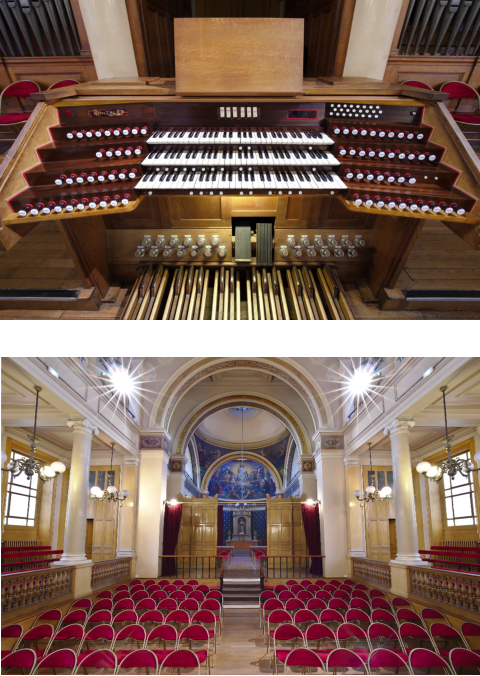


ORGANS OF PARIS © 2024 Vincent Hildebrandt HOME ALL ORGANS
Institut National
des jeunes aveugles
56, boulevard des Invalides, 75007 ParisSalle Marchal
Salle Langlais >
Salle Duroc >

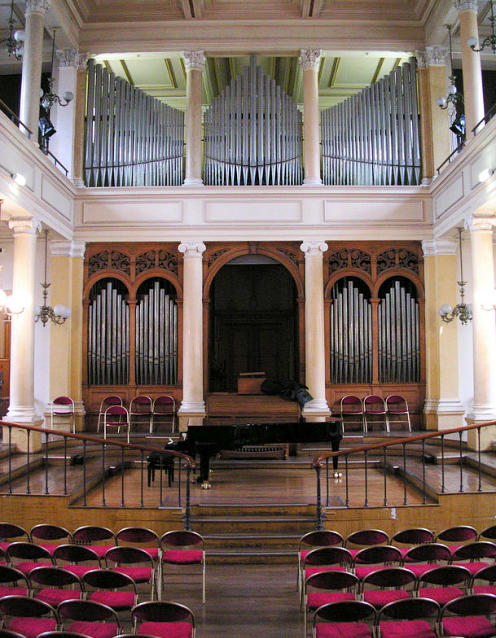

The National Institute for young blinds (INJA) was
founded in 1784 by Valentin Haüy. A famous pupil
(and later teacher) was Louis Braille, the inventor of
the braille system. From its start, the teaching of
music has been an important part of the
educational program of this institute The first organ
class started in 1826 and by 1833 no less than 14
blind students held organist positions in the
churches of Paris. The institute continued to
produce large number of successful organists such
as Louis Vierne, André Marchal, Jean Langlais and
Gaston Litaize.
The present building dates from 1844.
Further details (in French)…

D4
1883
It is an organ originally built by Cavaillé-Coll in 1883. It
featured 34 stops spread over three 56-note manuals and a
30-note pedalboard. The stops of the Grand-Orgue keyboard
were located in the right side of the case. The stops of the
Positif and Récit keyboards were placed on the left side of
the case. As for the pedal stops, they were placed at the back
of the cases, divided in half. At least two of the three manual
keyboards were expressive.
The instrument underwent a first transformation in 1910 by
Jean-Baptiste Puget: removal of the Barker machine and
replacement of the mechanical transmission with a tubular
pneumatic transmission. In addition, dismantling and
renovation of the windchests of Positif and Récit (split). The
instrumental part was enclosed in two expressive boxes: one
for the Great Organ and the Pedal, the other for the Positive
and the Recital.
1926
Overhaul by Auguste Convers.
1949
A few small changes in the stoplist, orienting it towards a
more neo-classical aesthetic by Beuchet-Debierre.
1959-1961
Gonzalez carried out a series of works aimed at transforming
the aesthetics of the organ according to the neo-classical
aesthetic with re-using many elements of the old organ:
additions of mutations to the positive (nazard, tierce and
cymbal), deletion of romantic stops in the Récit. The slightly
completed Great Organ remains in the right-hand case. The
Swell is greatly increased but remains in the left sideboard.
On the other hand, a new sound plan of Positif was created
on the gallery of the 1st floor, above the Cavaillé-Coll buffets.
Also on the 1st floor, installation of new pedal stops.
Creation of a new mobile console. The composition was then
increased to 68 stops spread over 3 manuals.
1982/1997
Overhauls by Gonzalez and Dargassies
Source:
Dominique Levacque Considerations upon the history of the
organs of INJA (in French)
Organiste titulaire
Dominique Levacque
Famous organists in the past: Louis Vierne, André
Marchal, Gaston Litaize, Jean Langlais
Concerts
Occasionaly (only on the organ of Salle Marchal)
Videos
Dominique Levacque
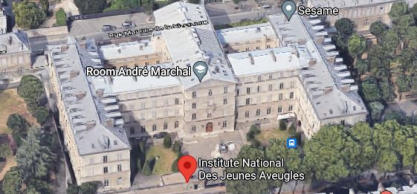
1885 - Cavaillé-Coll (1)
1910 - Puget (3a)
1926 - Convers (6)
1949 - Beuchet (3a)
1961- Gonzalez (3b)
1982 - Gonzalez (6)
1997 - Dargassies (6)
III/70 (64) - transmission électrique -
composition
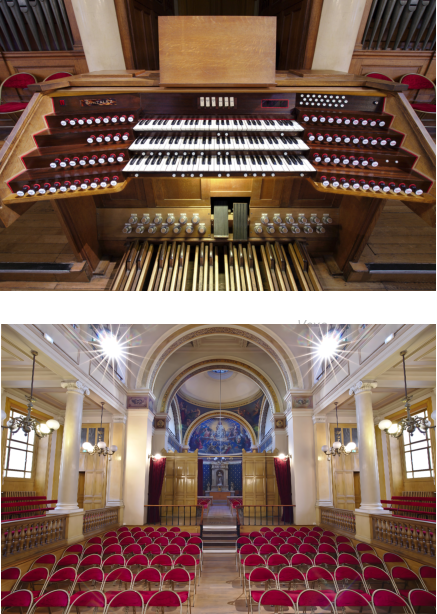
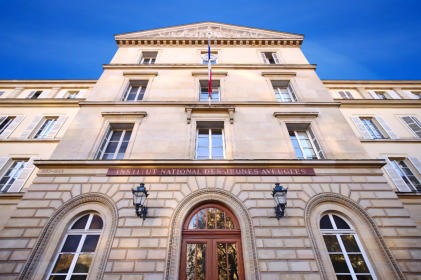
Organs of Paris
Institut National
des jeunes
aveugles
56, boulevard des Invalides, 75007 ParisSalle Marchal
Salle Langlais >
Salle Duroc >
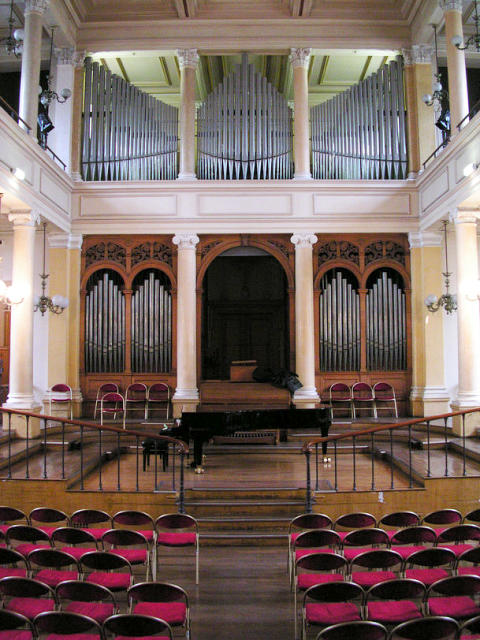
ORGANS OF PARIS © 2024 Vincent Hildebrandt ALL ORGANS
Organiste titulaire
Dominique Levacque
Famous organists in the past: Louis Vierne, André Marchal,
Gaston Litaize, Jean Langlais
Concerts
Occasionaly (only on the organ of Salle Marchal)
Videos
Dominique Levacque
D4
1883
It is an organ originally built by Cavaillé-Coll in 1883. It
featured 34 stops spread over three 56-note manuals and a
30-note pedalboard. The stops of the Grand-Orgue keyboard
were located in the right side of the case. The stops of the
Positif and Récit keyboards were placed on the left side of the
case. As for the pedal stops, they were placed at the back of
the cases, divided in half. At least two of the three manual
keyboards were expressive.
The instrument underwent a first transformation in 1910 by
Jean-Baptiste Puget: removal of the Barker machine and
replacement of the mechanical transmission with a tubular
pneumatic transmission. In addition, dismantling and
renovation of the windchests of Positif and Récit (split). The
instrumental part was enclosed in two expressive boxes: one
for the Great Organ and the Pedal, the other for the Positive
and the Recital.
1926
Overhaul by Auguste Convers.
1949
A few small changes in the stoplist, orienting it towards a
more neo-classical aesthetic by Beuchet-Debierre.
1959-1961
Gonzalez carried out a series of works aimed at transforming
the aesthetics of the organ according to the neo-classical
aesthetic with re-using many elements of the old organ:
additions of mutations to the positive (nazard, tierce and
cymbal), deletion of romantic stops in the Récit. The slightly
completed Great Organ remains in the right-hand case. The
Swell is greatly increased but remains in the left sideboard.
On the other hand, a new sound plan of Positif was created
on the gallery of the 1st floor, above the Cavaillé-Coll buffets.
Also on the 1st floor, installation of new pedal stops. Creation
of a new mobile console. The composition was then
increased to 68 stops spread over 3 manuals.
1982/1997
Overhauls by Gonzalez and Dargassies
Source:
Dominique Levacque Considerations upon the history of the
organs of INJA (in French)
1885 - Cavaillé-Coll (1)
1910 - Puget (3a)
1926 - Convers (6)
1949 - Beuchet (3a)
1961- Gonzalez (3b)
1982 - Gonzalez (6)
1997 - Dargassies (6)
III/70 (64) - transmission électrique -
composition
